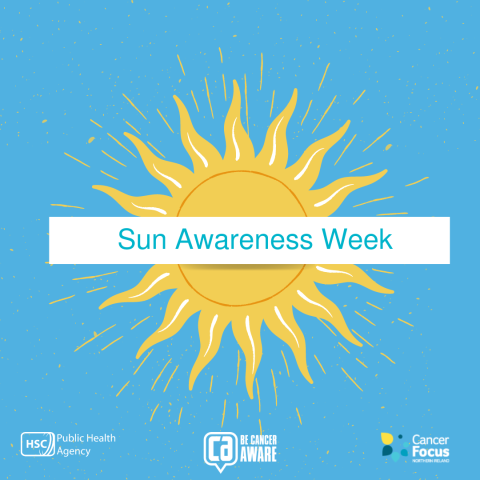Sun Awareness Week: Get the most protection from your sunscreen

This Sun Awareness Week [6-12 May], the Public Health Agency (PHA) and Cancer Focus Northern Ireland are encouraging everyone to be UV aware and get the best from your sunscreen to help reduce your risk of skin cancer.
Dr Louise Herron, Deputy Director of Public Health at the PHA, said: “As the days begin to get brighter, many of us will be keen to spend some time outside in the sun. While sunlight is important for our overall health and wellbeing, too much UV radiation from the sun can cause damage to the skin and lead to skin cancer. The majority of all skin cancers are preventable by undertaking simple sun protection measures such as using the right sunscreen and applying it properly.
“In Northern Ireland the UV levels are often 3 or more, even on cool or cloudy days, meaning the rays from the sun can be strong enough to damage our skin and eyes. Your skin is damaged by sun exposure over your lifetime, whether you burn or not. So, as the days get longer and the sun gets stronger, it is important for everyone to wear sunscreen correctly for maximum protection.”
The Solar UV Index shows how much solar radiation is reaching us from the sun and how careful we need to be. UV levels vary with the seasons and time of day, but when the UV index is three or above we need to protect our skin and eyes, so it’s important to know what the UV index is going to be throughout the day.
When choosing sunscreen, it’s important to get one that offers protection against both UVA and UVB rays which can speed up skin ageing, cause burning and increase the risk of developing skin cancer.
To reduce your exposure to UVB rays, your sunscreen should be at least SPF30 and make sure it has a UVA rating of 4 or 5 stars.
How you apply your sunscreen also affects how well it protects you. Most people don’t apply enough sunscreen.
To maximise protection against UV damage, at least six full teaspoonfuls of sunscreen lotion are needed for an all over body application for an average adult.
You should use:
- more than half a teaspoon of sunscreen to each arm;
- over half a teaspoon for the face and neck, including the ears;
- just over one teaspoon for the front of your body;
- just over one teaspoon for the back of your body;
- just over one teaspoon for each leg.
To give a good level of protection, sunscreen needs to be applied generously 30 minutes before you go outdoors, then reapplied every two hours, or more frequently after swimming, sweating, or towelling the skin.
Doreen Regan, Skin Cancer Prevention Coordinator at Cancer Focus NI, said: “Skin cancer is the most common form of cancer in Northern Ireland, accounting for more than 31% of all cancers diagnosed. Over 4,000 people develop skin cancer each year and almost 1 in 10 of these are malignant melanoma, the most serious form of skin cancer. Malignant melanoma rates have risen over the past 30 years from an average of 103 cases per year in the mid-1980s, to 382 cases in recent years.
We would encourage everyone to follow our simple steps to help protect your skin and reduce your risk of skin cancer.”
Other ways you can reduce your risk of skin cancer include:
- know the UV index and when it is 3 or more, protect your skin and eyes;
- seek shade when the UV rays are strongest between 11am and 3pm;
- cover up in the sun with a long-sleeved t-shirt and a broad brim hat;
- wear sunglasses that have CE or EN Standard Marks, which carry a UV 400 label and offer 100% UV protection. This will ensure they provide adequate protection from both UVA and UVB;
- sunglasses should fit your face well and relatively snugly so that light doesn't enter your eye from around the lens;
- avoid using sunbeds.
You can find out what the daily UV index is for your area through the weather app on your smartphone or by downloading the Met Office app.
To find out more about taking care in the sun, visit www.careinthesun.org
